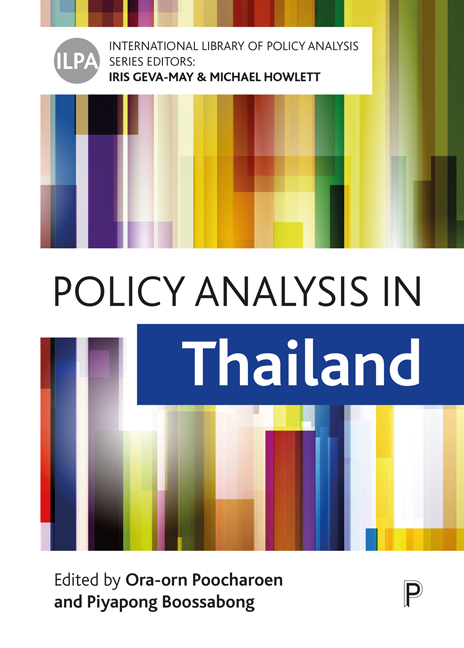Book contents
- Frontmatter
- Contents
- List of figures and tables
- List of abbreviations
- Notes on contributors
- Editors’ introduction to the series
- Introduction
- Part One History, styles and methods of policy analysis in Thailand
- Part Two Policy analysis within executive government
- Part Three Policy analysis beyond executive government
- Part Four Political parties and interest groups in policy analysis
- Part Five Policy analysis education and research
- Index
sixteen - Non-traditional policy studies in Thailand
Published online by Cambridge University Press: 20 January 2024
- Frontmatter
- Contents
- List of figures and tables
- List of abbreviations
- Notes on contributors
- Editors’ introduction to the series
- Introduction
- Part One History, styles and methods of policy analysis in Thailand
- Part Two Policy analysis within executive government
- Part Three Policy analysis beyond executive government
- Part Four Political parties and interest groups in policy analysis
- Part Five Policy analysis education and research
- Index
Summary
Introduction
The study of public policy in Thailand can be traced back to the late 1890s where technical policy knowledge was the main kind of policy knowledge that civil servants had to learn for public administration (PA) (Boossabong, 2017c; see also Chapter One, this volume). This establishment has shaped the field of policy studies to prioritise instrumental, technocratic reasoning based on logical positivism under the umbrella of the Cold War version of an American PA and, unfortunately, discourage the development of alternative interpretive and critical reasoning. Policy studies have barely been developed to include alternative approaches in their analyses and methodologies that go beyond the depoliticised economic and managerial perspectives until the 1980s.
In this chapter, non-traditional policy studies can be referred to as ‘alternative approaches’ to the study of public policy that propose propositions and applications of theories, concepts or metaphors of public policy which attempt to transcend empiricist, positivist ways of knowledge generation and/or naive techno-rationalist, instrumental, statist views of policy making and analysis both inside and outside the realm of PA.
This chapter aims to provide an observation of the major academic developments, albeit selectively, which have arguably helped constitute alternative approaches to the study of public policy in Thailand. Various attempts to provide alternative approaches have gradually developed since the 1980s. They have encouraged us to inquire into the politics and governance in the policy process, interpretation and normative dimensions of policy knowledge, critical theory and limitations of techno-rationalist/instrumentalist modes of policy analysis and policy making, to name a few.
A tale of two policy studies: policy analysis in public administration and policy process in politics
The study of public policy in higher education has been largely administrated, educated and researched in the Department of PA as well as the Department of Politics and Government (Ungsuchaval et al, 2023), which has, in turn, classified the study of public policy into two important branches (Sirisamphan, 1996; Thamrongthanyawong, 1997; Anumanrajadhon, 2004; Yavaprabhas and Whangmahaporn, 2009).
- Type
- Chapter
- Information
- Policy Analysis in Thailand , pp. 286 - 302Publisher: Bristol University PressPrint publication year: 2023



